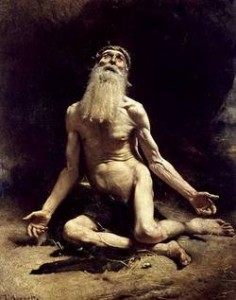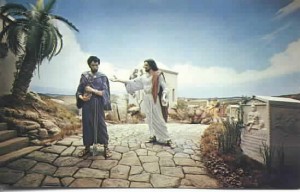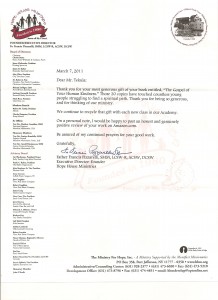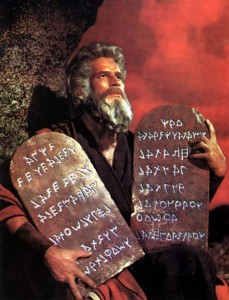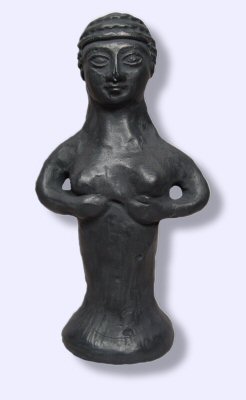{ 0 comments }
And there followed him a certain young man, having a linen cloth cast about his naked body; and the young men laid hold on him: And he left the linen cloth, and fled from them naked. Mark 14:51-52
One day he went into the house to attend to his duties, and none of the household servants was inside. She caught him by his cloak and said, “Come to bed with me!” But he left his cloak in her hand and ran out of the house. When she saw that he had left his cloak in her hand and had run out of the house, she called her household servants. “Look,” she said to them, “this Hebrew has been brought to us to make sport of us! He came in here to sleep with me, but I screamed. When he heard me scream for help, he left his cloak beside me and ran out of the house.” She kept his cloak beside her until his master came home. Then she told him this story: “That Hebrew slave you brought us came to me to make sport of me. But as soon as I screamed for help, he left his cloak beside me and ran out of the house.” When his master heard the story his wife told him, saying, “This is how your slave treated me,” he burned with anger. Joseph’s master took him and put him in prison, the place where the king’s prisoners were confined. Gen. 39: 11-20
But the goat, on which the lot fell to be the scapegoat, shall be presented alive before the Lord, to make an atonement with him, and to let him go for a scapegoat into the wilderness. Lev. 16:10And he that let go the goat for the scapegoat shall wash his clothes, and bathe his flesh in water, and afterward come into the camp.v. 26
The United States has emerged as the one and only “company of nations” (Gen. 48:19) that fulfills all the Promises and prophetic utterances of what would become of the the descendants of Joseph in “the last days”. Its name — “United States” — is even a perfect alternate linguistic rendering of the phrase from Jacob’s lips as it is most often translated. But it literally means “fullness of the Gentiles” — a phrase repeated by the Apostle Paul at the end of his explanation to the converted pagans of Rome how they were a wild branch grafted onto the cultivated Hebrew tree:
Lest you be wise in your own sight, I want you to understand this mystery: a partial hardening has come upon Israel, until the fullness of the Gentiles has come in. Romans 11:25
The United States — the “company of nations” whose citizens have done more to bring more of the non-Semitic peoples of the world in contact with and under the umbrella of the belief systems and cultural morays of what began with Abraham’s little Middle Eastern clan than any other national grouping — is in itself and its actions the “fullness of the Gentiles.” And yet no one who attempts to put forth the obvious — that America is Lost Joseph found — gains acceptance by the Judeo-Christian mainstream.
Joseph is the one Old Testament hero that had no flaws. He did not give in to the temptations of his master’s wife — and it was reported that this was in part out of loyalty to his pagan master. He did not doubt God’s Promise as Abraham did; he did not favor the worldly son over God’s chosen as Isaac did; he did not lie and cheat to get what he felt he deserved as his father Jacob had done. And he resisted illicit sexual temptations as was the downfall of Samson and both Kings David and Solomon. The one who had dreams of preeminence among the children of Abraham, Isaac and Jacob — to whom even the sun, moon and stars of heaven were to pay homage — had become a household slave in Egypt dedicated to his slave-master even to the point of death. There is no sign of resentment against his murderous brethren — no sign of dejection — no loss of faith in his God. And when he reemerges to his brothers he is for all intents and purposes a pagan Egyptian. And — as such — he saves them and the whole known world from a terrible drought and famine in the land.
Did not the United States mirror the Hebrew/Gentile savior Joseph in the post WWII Western world? Why is it so difficult for the West to accept all these signs as meaning what they are telling us?
It is because of the role the Biblical people of the West have relegated the Lost Tribes of Joseph to — they must remain the one example of a formerly “Chosen People ” whose sins were just too much for the All Merciful God of Abraham to forgive — or they will forced to view their own hypocrisies.
{ 0 comments }
It is an ironic mystery that even Christians — and I mean the Christian hierarchical intelligentsia — don’t really believe what they teach. If Jesus was God’s One True Human Representation of Himself then the words He spoke were more than human teachings of lofty principles that would require lengthy diatribes by learned clerics in order for the laity to access them. They of a necessity are the very principles themselves. It’s as if in the process of discovering the “God particle” the quantum physicists heard it say, “A sower went forth to sow …”.
Having been blessed (or cursed–depending on my reaction to the particular remembrance) with an enhanced autobiographical memory I can see, hear and feel my childhood friends marvel at my total lack of belief in God. For these beautiful Roman Catholic children of post WW II Levittown filled with love, joy and hope God was real — Jesus loved them and Mary was smiling on them every day.
I would have none of it. I was being loyal to my parents who — and for the life of me at sixty I still cannot fathom how or why they resisted the sheer peer pressure to submit — hated God and the Church and anything that related to those things. I was told when I had asked why back then –in one of my earliest memories of processing the spoken word — that we were “different” and “smarter” then they.
To this day I am plagued by needing to prove my parents right. I cannot even be certain that this blog –dedicated to promoting belief in the Christian God of the Bible — is not really a further attempt to foster the agenda of the Tekula family who lived at the bottom of the little hill on the northwest corner of Bloomingdale Road and Gleaner Lane.
Today most of these kids I knew are not now active believers. In fact I am the most fervent Christian of all that I have come in contact with. And today I am having a sense — perhaps even an epiphany — as to what happened to them. From what I can gather from memory and conjecture they were being taught that what they were to be about with the gift of faith each had been given was to make the world a better place. Well — while certainly a different place from the culture of the mid-20th Century I don’t think many would call it better — especially from the point of view of a young person back then. I cannot blame any of them — me included — for the modern pervasive sense of frustration and confusion on that point.
Listening to the words of Jesus from the Gospels I can’t help but wonder where the idea of changing the world as a Heavenly agenda got into Christian Catholic catechism. Jesus spoke a parable about letting the weeds grow with the wheat lest in pulling up the “tares” you uproot some of the good growing crops. He taught directly not to put any hope in this world “where moth and rust will corrupt and thieves break in and steal.” The mistake all the followers — from those at the periphery to the twelve apostles themselves — made was to think that the Messiah of God had come to change their local world and from there spread the Kingdom of righteousness, justice and peace.
How could they believe such a thing having heard His words with their own ears? I’m thinking that we are all like toddlers who want the ice cream now even though Mommy said “Not until after you eat your dinner“….
{ 0 comments }
{ 1 comment }
Now, Father, glorify me with that glory I had with you before the world existed. I have revealed your name to those you took from the world to give me. They were yours and you gave them to me, and they have kept your word. Now at last they have recognized that all you have given me comes from you for I have given them the teaching you gave to me, and they have indeed accepted it and know for certain that I came from you, and have believed that it was you that sent me. John 17:5-8
{ 3 comments }
If you want a Biblical argument just bring up the Book of Job. The interesting thing about this experience is that all but one of the arguments will sound like the reasonings of Job’s “friends” who had come to offer him “comfort.” But anyone who knows the story knows that when God finally shows up to explain Himself for allowing this perfect man to suffer so, He first rebukes these false counselors. The reason for this dichotomy is that the real moral of the story of Job — that God’s lesson to him was that “I’m God and you’re not” — is so discomforting, at least to we in the affluent West.
As written it is a wonderful parallel to the other most controversial tale of the Old Testament — Adam and Eve in the Garden of Eden — also, as it is written. Both are stories of having it all and then losing it all and then gaining it back. In Job the getting it all back part is included as an addendum at the end of the story. For Adam and Eve the rest of the Bible is that addendum.
A Zen saying: Above is a river flowing — below the vast ocean. In between them is a waterfall. The totality of our individual conscious lives occurs between the river and the ocean.
We are all in the “in between” phase of life. None of us has any real knowledge of the befores or the afters. But the place we are in is a place of loss. We are in the realm of “Life is a bitch — then you die.” The goal of getting a lot of money is Western Civilization’s answer to alleviate the former half of that “bumper-sticker” statement. No one has an answer to the latter. In fact, the longer medical “miracles” can push back the inevitability of death, the harder it becomes to escape life’s hardships no matter how much money you have.
This is where Adam and Eve were banished to. And you don’t get back into Paradise where all the animals are our friends and we just have to sachet around naked picking fruit to eat just by practicing some ancient cleansing ritual and confessing our sins. We are here to stay — for now.
Here we come in close contact with things and people we love and cherish dearly, wanting to have and to hold them forever — but knowing all along that at death we will part — if not before. In fact, we are in the place Job was where God allowed this “perfect” man to be tested by the piece by piece deconstructing of his life.
Another parallel story is in the Gospels — the one about the rich young prince of Judah. He wanted to know what he must do to “inherit eternal life.” Jesus reminded him of the Commandments of Moses. He responded: “I have kept them all since childhood.”
“Hearing this Jesus said to him, ‘This one thing you lack — sell all you have and give the money to the poor and you will have treasure in heaven. Then come and follow me.’” Luke18:22
The rich and otherwise saintly Jewish ruler went his way “full of sorrow for he was very rich.”
Jesus went on to teach about the great difficulty for wealthy individuals to get into the Kingdom of God — as difficult as it would be “for a camel to get through the eye of a needle.” The people were wondering how under such a strict standard anyone could enter. Jesus responded to them with this famous assurance: “What is humanly impossible is possible for God.”v27
The imagery seems to indicate that anyone — no matter what their estate in this life — can get into heaven if they really want to be there. But for some it will hurt more than for others.
I just heard an up and coming Roman Catholic televangelist priest preach to a small congregation of affluent white congregants (and we television viewers) about the issue of attachment to material things. He seemed to be saying that we don’t have to give up anything — we just have to beware of attachment to worldly riches. But if the rich prince of Judah had actually kept all the Commandments — and by the response of the One “who knew the hearts of men” we must assume he was telling the truth — he was a champion of detachment: he did not lie, cheat or steal, he was not covetous, did not worship anything but God. So what did he lack?
To get insight into this perplexing question we can look at a similar Gospel account — that of Zacchaeus the tax collector. Zacchaeus was a chief tax collector, a man among men who were most reviled by their peers for profiting through the aiding and abetting of the Gentile pagan Roman invaders in their subjugation of their Hebrew brethren. Zacchaeus was also “very rich,” according to the story. He was a short man and to get a look at the young Galilean Rabbi as he passed he climbed a tree. Jesus called him by name and immediately told him to climb down as this traitorous crook was to host a dinner in His honor that night. Luke tells us that –“All the people saw this and began to mutter, ‘He has gone to be the guest of a sinner.’” Luke18:7
On the spot Zacchaeus made a deal with the Messiah: “Look, Lord! Here and now I give half my possessions to the poor and if I have cheated anybody of anything I will pay back four times the amount.” v8
In contract law there must be an offer and an acceptance: “Jesus said to him, ‘Today salvation has come to this house, because this man, too, is a son of Abraham. For the Son of Man has come to seek and to save the lost.”v9
According to ancient tradition Zacchaeus went on to become the Apostle Matthew, the writer of the first Gospel.
Packed into Jesus’s response is much to look at — but herein I will deal with only the fact that the Lord accepted his immediate offer of “half his riches to the poor” and a future promise to pay back those he cheated in quadruple.
For the one all his neighbors saw as a despicable sinner this was sufficient; but for the famous hero of the land — the success story of Judea — naught but “everything he had” would do.
Psychological detachment — according to this — is not the one thing the rich prince lacked that Zacchaeus had as a part of his life. To infer this we have to add to what is lacking in the story — this to make our own affluent American assumptions true. What Zacchaeus already had in his life that the Judean prince lacked was loss. Though rich, Zacchaeus was not a Jew among Jews — this is indicated by Jesus saying that he was “also a son of Abraham.” At that time those who were identified as “Jews” were special in that social structure as they could trace their genealogy through parental lineage to Father Abraham. Zacchaeus’s family, like those of most of his Israelite contemporaries, had lost that ability because of the Assyrian invasions centuries before. Zacchaeus was also “very rich” but he was not a hero in his town and region — he was a pariah. Everyday his dignity and self-respect suffered, as did that of his family. Plus he was very short — literally looked down upon by almost everyone else.
What Job lacked as the “perfect” man is exactly what the rich young prince lacked in his experience of this life. We can infer from what Jesus said in response to the rich man’s rejection of the offer He made to him that the Father in His love for this man would begin to display His terrible mercy upon his life — the kind that Robert Kennedy spoke of in his impromptu speech to the crowd in Indianapolis on the night after the assassination of Martin Luther King, quoting the poet Aeschylus: “Even in our sleep, pain which cannot forget falls drop by drop upon the heart, until, in our own despair, against our will, comes wisdom through the awful grace of God.” It was a subject — the subject of real and biting loss — that he himself had intimate knowledge of — and RFK’s own loved ones would learn first hand later in that fateful spring of 1968.
This would be that the Loving God of Heaven would see that if this rich prince and saint among his people — a man born into the wealth of his forebears — didn’t willingly give in to God’s will for his life (i.e., to become a willing pauper) that he soon after would begin — beyond his control — to lose everything he had.
{ 6 comments }
My adaptation of John’s Gospel, The Gospel of Pure Human Kindness, began as an experiment — by giving Jesus a narrative name that matched a major aspect of His essence (much as the name given Him by the Angel Gabriel identified His mission and needed no translation for those He walked among) would the message in the Gospel story be enhanced?
Not only was the answer a big affirmative “Yes!” — but just the exercise itself gave me a completely new perspective on the God in whom I had come to believe in four decades before. By focusing on what the “Beloved Apostle” had endeavored to tell us were the actions and attitudes of the One who had revealed Himself firsthand to young John as the Only Begotten Son of God, the Word of God made Flesh, the Way the Truth and the Life, I was getting a new glimpse of the Creator and Father of all. And He — who chided Philip into understanding that “… if you have seen me you have seen the Father” — is much different than the way He is being depicted by many — and perhaps most — modern Christian theologians, preachers and Bible scholars.
The way He dealt with sinfulness in the Gospels belies most modern conventional thinking on the matter. Neither a woman caught in the act of adultery and dragged kicking and screaming to His feet nor a man paralyzed from birth who was carried spontaneously by four men onto the roof of the house Jesus was teaching in and lowered to His presence by ropes did anything to get there. Nor did either express any remorse for or even a desire to be forgiven of their sins. Yet both went on their way justified — both healed emotionally and the latter physically. No preacher I have ever heard treats sin so lightly.
Putting the Gospel tales into their historical context, the land of Judea had become a vassal state of the pagan Roman Empire. Zacchaeus was a Jew who was collecting taxes for these Gentile crooks and was a crook himself, cheating his own people. Yet when all he did was to climb a tree to get a better look at the young Galilean rabbi as He passed by, Jesus told this conniving slime ball that it was his lucky day — that he was going to host a dinner in Jesus’s honor that night. Zaccaeus swore on the spot that he would sell half of his belongings and use the proceeds to pay back those he had swindled. Zaccaeus became Matthew the Apostle, the writer of the first Gospel. Juxtapose this with the rich young prince of Judah, who had kept the law meticulously all his life. When he asked Jesus what he must do to become a disciple, Jesus told him that he lacked just one thing: “Sell all your belongings and give the money to the poor, and then come and follow me.” The Gospel writer reports, “The man went his way very sad, because he had many possessions.” Zaccaeus the cheat in cahoots with the pagan, murderous Romans gave up only half — the saintly but rich Jew had to give up all.
The Samaritan woman also did nothing to confess or undo her adulterous ways — a simple reading between the written details exposes her as also trying to seduce the Lord Himself. But she was the first one to whom He freely and openly revealed who He was and the true nature of His mission and she instantly became the most successful evangelist of all the Gospel stories.
It appears in the light of these narratives that Jesus — and by extension, God the Father of All — doesn’t need or require any special gyrations or genuflections — verbal, physical or emotional — to deliver His kind loving mercies. We just need to be made available.
But there is one attachment that can stymie the process.
“One thing you lack.”
It would seem that our entire society lacks this one thing: “A man can’t have two masters — you can’t serve God and money.” But we are all forced into the position of serving money. In our society you can’t do anything without money. And it would seem that the more you have the more you need. This is the first civilization on the face of the earth that has this malady. It is also the first to question en masse the existence and/or the all importance of believing in and serving God. Today for most God is a side issue — religion a marginalized institution. But money is center stage, top of the news, the all-powerful entity. With it you can do anything — without it nothing.
And yet it doesn’t really exist. It has become an open secret that the money supply increases by the incurring of personal and corporate debt. Our money is no longer backed by a valuable — and real — commodity such as gold or silver. Supporting it all most tenuously are millions of individual promises to pay — called promissory notes.
But beyond this appalling factoid, the cash and coin and the numbers on account statements only mean something because we all believe they do. Beyond human imagination money has no reality — which means it has no reality at all.
It is like “The Emperor Has No Clothes” — only it is “The Rich Man Has Nothing of Real Value” for our purposes here.
A tree exists — no tree has ever fallen in a forest with no one to hear it, despite the gloating of French existentialists when they asked their infamous and stupid question. Bugs and birds and squirrels and monkeys have ears too. And sound does not need an ear to be sound, since sound is made of waves traveling through the air. If a tree fell on the moon no one would hear it because it would not have made a sound — no air, ergo no sound waves. But the ground would shake and the dust would rise. I could keep going — but I won’t. The tree is real. We can change it’s form and make it into a table and chairs — we can burn it, releasing energy by the rapid oxidation process — but the totality of its mass remains, converted into gases and ash. This is the way of all created reality.
We can make a tree into pulp and use it along with other real elements to fashion a dollar bill. We can manipulate the ink to replace George Washington’s image with that of Andrew Jackson and — as if by magic — it is now worth twenty George Washingtons. But if you drop both a dollar bill and a bill of any other denomination on the moon there would be no difference in the effect — except maybe that the astronauts might be more likely to claim the one with the higher amount printed on it.
A space monkey would pay little attention to either.
Money and a Mustard Seed
“If you had faith the size of a mustard seed you could tell this mountain to cast itself into the sea and it would obey you.” But with money it is not so simple — even for God. If He created money out of nothing in answer to our prayers it would be counterfeit — unless He also convinced the Federal Reserve to update its records for the new serial numbers. If he mysteriously transferred some from someone else’s account into yours and you spent it you would be guilty of larceny — since only God would be saying it was now yours and the people who balance the bank’s books don’t listen to God’s spoken decrees when they do their jobs.
To get more money in our pockets even God has to convince other people to do something. And people are notorious for their disobedience of Divine ordinances. Many prayers went unanswered with the rich young Jewish ruler’s inability to detach himself from his wealth for Christ’s sake.
The truth is that the only real property that God had no hand in bringing into existence and therefore has no rightful claim to is money — we created it and it all belongs us. Well — some of us.
The value system of Heaven, it would seem, is based on another commodity — something called “Virtue.” By definition we are gifted with virtues — made up of specific “talents” that we must nurture to perfect and retain. It is the Power of Good. But here on earth those of us who display such talents in athletics, music or writing ability or even in strong interpersonal character traits are not deemed successful unless we get rich by them. The last example is what actors sell to us in the media marketplace. Even the most successful religious renunciates in society’s eyes are the ones who bring in the most money for their religious orders and ministries. And it is quite a public high wire act that these individuals perform amassing wealth and fame while attempting to not lose these talents. The vast majority don’t make it for long — at least by human standards. The few that do are the celebrated — the human idols that we heap with praise and glory, feeling as if we have some secret intimacy with them. But just like the money they have — that has passed through each of our hands, at some point — our relationship with these “stars” is phantom.
Money is our God. The Golden Cash Calf is King and publishers and movie moguls even get rich on the Tablets of Moses and the story of Jesus of Nazareth. Fundamentalists and Evangelicals are waiting for the coming of the Antichrist to deceive the inhabitants of the earth with great signs and wonders – they’re waiting for the “Abomination of Desolation” to be set in the “Holy of Holies” where only God can sit without damnation being brought down upon the world. But these things have already occurred. We see money healing the sick, raising the dead, letting me type these words and then instantly have them published to every nation. Money has split the atom, put people on the moon, has let us look at the far reaches of the Universe. And how long does it take before we turn from realizing that we have awakened to the golden light of a new day that we must again bow to the Money God — the Unrighteous Mammon — and do whatever it bids us do to get our meager daily ration, forgetting Who it is that made us and sustains us? Money sits on the Throne of God on Earth right now.
The atheists’ argument is that believers in the Loving Almighty God of Heaven just believe because others do and that gives them comfort and security. And then the atheist looks up his bank balances online and feels comfort and security over numbers in cyberspace that only mean anything because we all believe that they do.
I see the connection.
Don’t you …?
{ 2 comments }
Say there was a species of whale shark that was far more common and had developed through the eons of evolutionary history a hybrid form of feeding — rather than filtering plankton and krill through its huge scoop-like mouth and gullet it dragged it’s open lower jaw over the sea bottom in search of particularly favored species of fish, mollusk and crustacean. It does this by taking everything into it’s mouth and then filtering unwanted species out its giant gills — some dead, some injured, some just stunned. Following in their wakes are multitudinous marine animals feeding upon these movable feasts, as they and their various and sundry genealogical forbears have done in the same waters for centuries. Generation after generation have come to rely upon this food supply for their survival. Say our hypothetical leviathan is called the “scoop shark.”
It is easy to see how the scoop shark would be an essential apex predator — not only for what it takes from the ecosystem but for what it gives to it. Any human activity that would endanger it’s population would be the target for stringent restrictions by the marine environmental lobby — they would claim that the entirety of the ecosystem would be in danger of collapse if this food producing source were to disappear.
Now make it real by making the mouth of the scoop shark out of synthetic rope and webbing and the gullet out of steel or fiberglass towing the open jaws from the sea surface powered by an internal combustion engine — and the selective filtering system is worked by human flesh, blood and bone. And instead of intentionally acting upon the interests of one organism of its own species each human scoop shark crew risks life and limb in the survival interests of thousands. As it now should be apparent, the “scoop shark” is a metaphor for our commercial trawler fleet which the environmentalists would completely eliminate as a totally destructive force with no redeeming ecological benefits.
This is a human rights issue — environmentalists are biased against the entire human race.
{ 0 comments }
The First Commandment prohibition did not allow the people to make any image of anything in the heavens, on the earth or under the water. What we in the West have a hard time comprehending is that the Mosaic Law and, in fact, all the books of the Torah — for Christians, the Law section of the Old Testament — were the one and only law of the land of ancient Israel, not just the heavens. All else was commentary. Lawfully permitted decorative artwork did not include human hand renditions of anything real.
The small sculpture of the fertility goddess above is an example of a kind of “contraband” that archeologists find in settlements all over the ancient Kingdom of Israel prior to the return from the Babylonian Exile in the 3rd Century BCE. And these were not just ornaments. They are actually ancient examples of pornography lifted to ritual status. The Assyrian based worship of the goddess Ashtoreth or Ishtar (which is where we get the term “Easter”) included male masturbation before the stone and clay female images with the ritual spreading of the semen upon the roots of the temple shrubbery. Of course the statues in the Assyrian temples themselves were far more comely and lifelike than the household statuettes were — but the latter had to be easily disguised or hidden if a priest or a lawyer were to show up at the door.
The Biblical accounts claim that this practice drove the entire Nation of Israel mad, and was the cause of it’s downfall in the centuries before the coming of Christ.
In the light of this, the effect of having these crude, rudimentary imagery of the naked female body in the homes of this people who were to worship the Loving and Invisible Transcendent God of Abraham, Isaac and Jacob alone — what’s going to happen to us?
{ 2 comments }






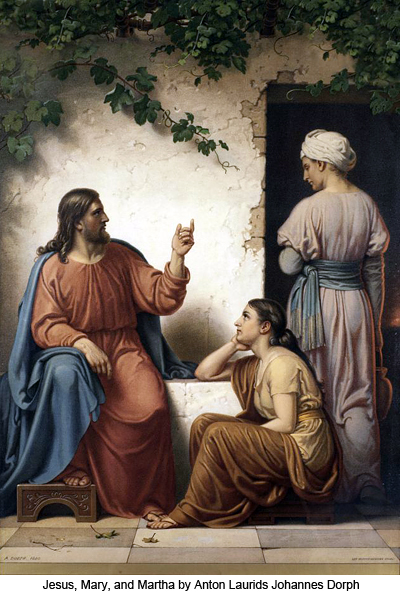

![www-St-Takla-org___Holy-Face-of-Jesus-22[1]](http://www.surfnetter.com/blog/wp-content/uploads/2011/10/www-St-Takla-org___Holy-Face-of-Jesus-221.jpg)
